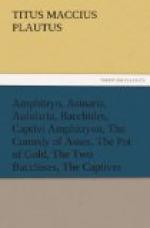Let you?
I beg you to, Chrysalus, and I beseech you, don’t
spare him in the
slightest!
Chrys.
Etiam me mones?
910
satin est si plura ex me audiet hodie
mala,
quam audivit umquam Clinia ex Demetrio?
(virtuously
indignant) D’ye warn me of that, me?
Is it
enough, if he
hears more hard words from me this day than
ever Clinia[L]
heard from Demetrius?[L]
[EXIT
Chrysalus INTO HOUSE OF Bacchis.
[Footnote L: Characters in some familiar play.]
Nic.
Lippi illic oculi servos est simillimus: si non est, nolis esse neque desideres; si est, abstinere quin attingas non queas. nam ni illic hodie forte fortuna his foret, miles Mnesilochum cum uxore opprimeret sua atque obtruncaret moechum manufestarium.
(ruefully) That servant of mine is very much like a sore eye: if you haven’t got one, you don’t want one and don’t miss it; if you have, you can’t keep your hands off it. Why, if he hadn’t happened by good luck to be here to-day, the Captain would have surprised Mnesilochus with his wife and cut him to pieces for an adulterer caught in the act.
nunc quasi decentis Philippis emi filium, quos dare promisi militi: quos non dabo 920 temere etiam prius quam filium convenero. numquam edepol quicquam temere credam Chrysalo; verum lubet etiam ni has perlegere denuo: aequomst tabellis consignatis credere.
As it is, I have bought my son, so to speak, for the two hundred pounds I promised to pay the Captain—two hundred I won’t be rash enough to pay him yet, before I have met the boy. I’ll put no rash confidence in Chrysalus, never, by heaven! But I’ve a mind to read this over (looking at letter) once more still: a man ought to have confidence in a sealed letter. [EXIT INTO HOUSE.
IV. 9.
Scene 9.
(Fifteen minutes have elapsed.)
ENTER Chrysalus FROM Bacchis’s HOUSE.
Chrys.
Atridae duo frates eluent fecisse facinus maxumum, quom Priami patriam Pergamum divina moenitum manu armis, equis, exercitu atque eximiis bellatoribus mille cum numero navium decumo anno post subegerunt. non pedibus termento fuit praeut ego erum expugnabo meum sine classe sineque exercitu et tanto numero militum.[24] 930 nunc prius quam huc senex venit, libet lamentari dum exeat. (932)
(bumptiously) The two sons of Atreus have the name of having done a mighty deed when Priam’s paternal city, Pergamum, “fortified by hand divine,” was laid low by ’em after ten years, and they with weapons, horses, and army and warriors of renown




